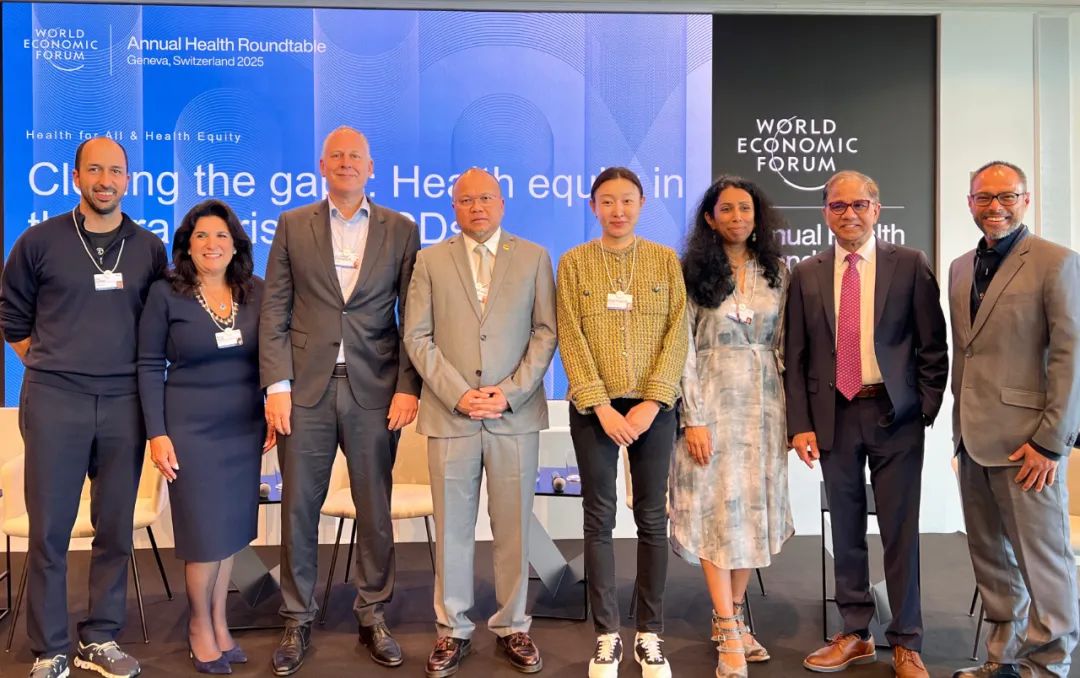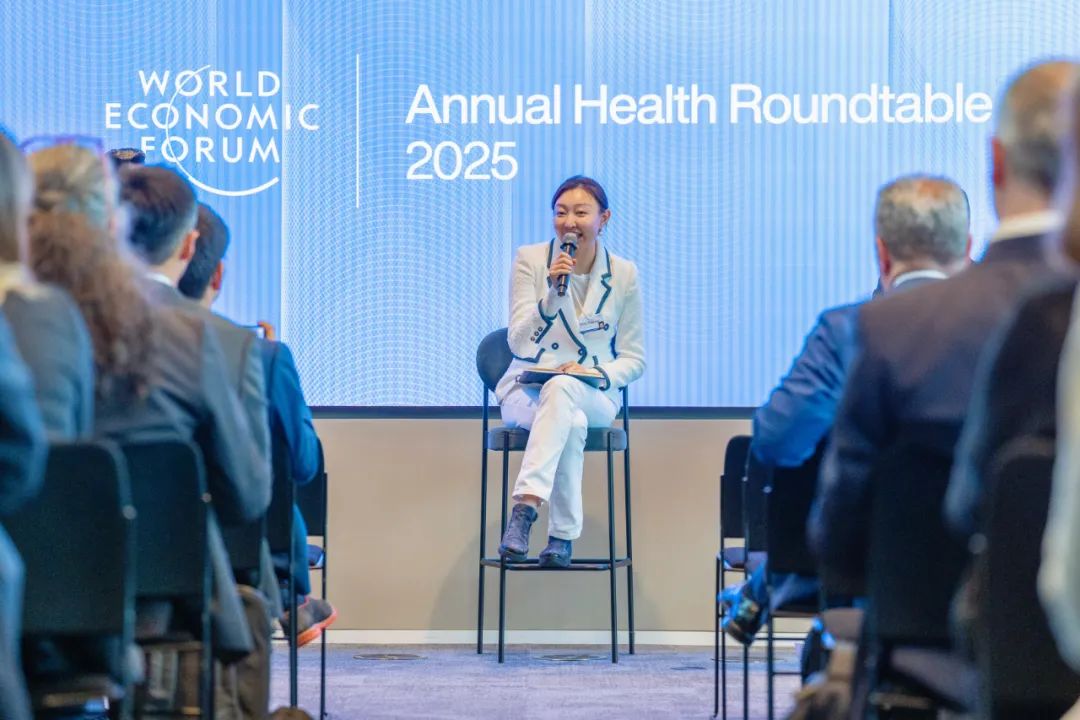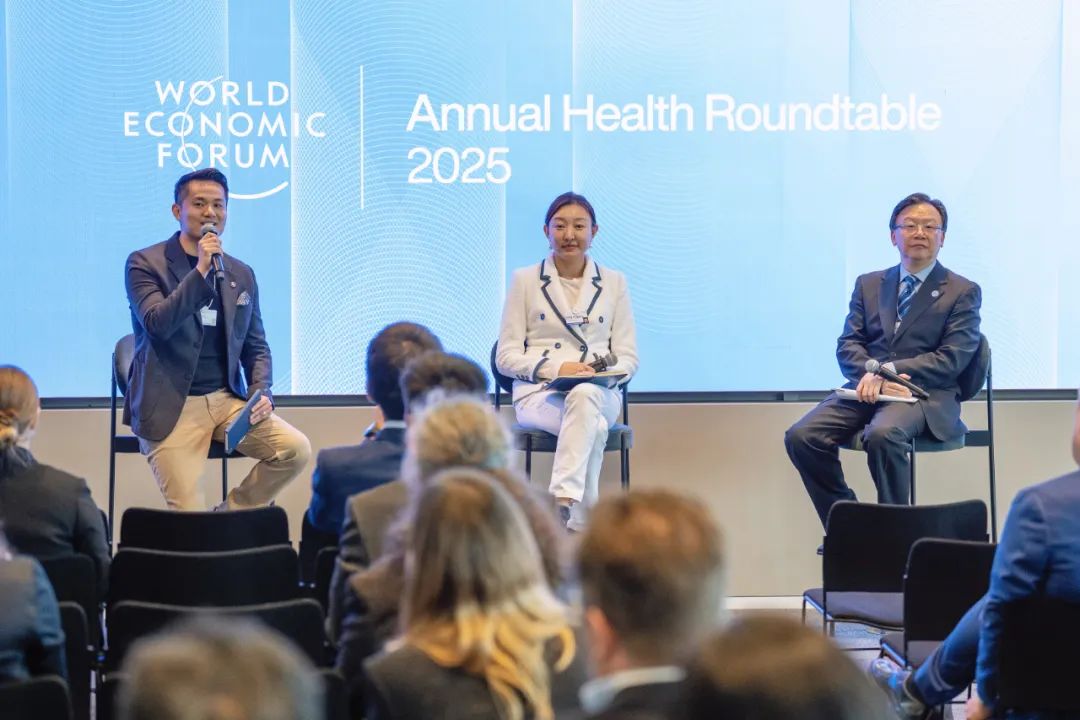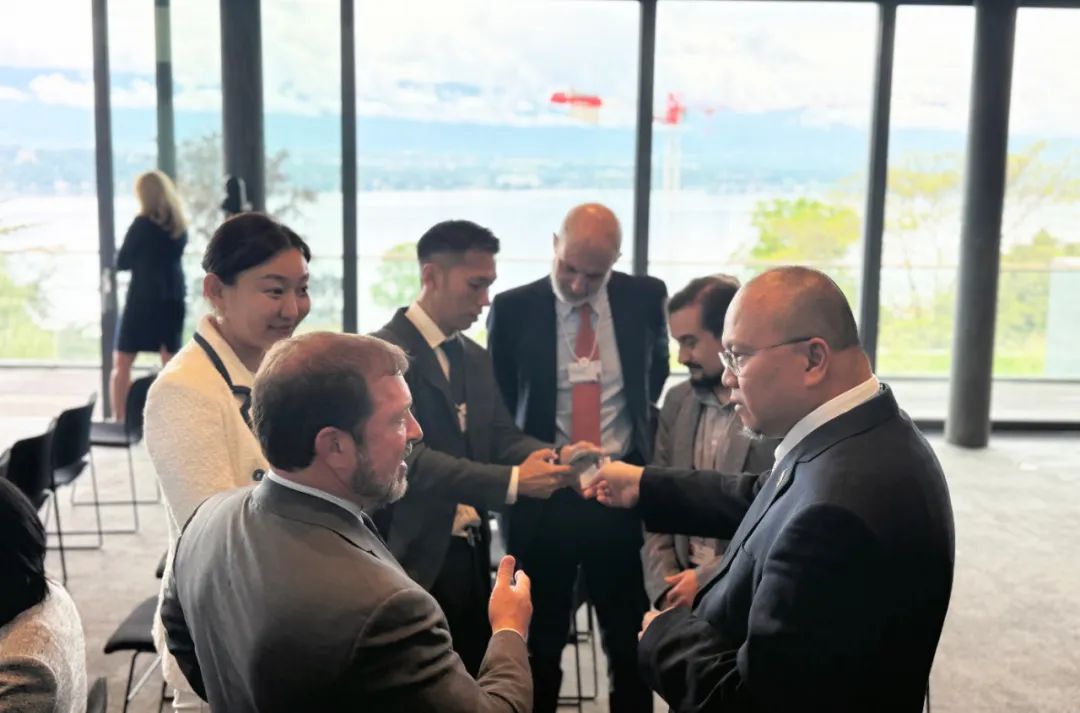Geneva Dialogue: Yidu Tech Uses Inclusive AI to Intelligently Address Health Equity Challenges
2025-05-23
Recently, the annual healthcare roundtable meeting was held at the World Economic Forum headquarters in Geneva, bringing together elites from global political, business, academic, and social sectors once again. Ms. Gong Rujing, Founder and Chairperson of Yidu Tech, was invited to attend as a representative of China's AI healthcare industry and a Young Global Leader, and delivered speeches in two key topic discussions.
During the conference, Ms. Gong Rujing sat with executives from leading global healthcare companies such as Philips, Colgate-Palmolive, Medtronic, and Huma to engage in in-depth discussions on the topic of "Universal Health and Health Equity." Brunei's Minister of Health, Dato Dr. Hj Mohd Isham, attended the meeting and delivered concluding remarks.

In another discussion on China's healthcare practices from a global perspective, Ms. Gong Rujing had a profound dialogue with Professor Ren Minghui from Peking University's School of Public Health and Dr. Liu Chang, Founder and CEO of ASK Health Asia, conveying China's innovative power and strategic insights to the international community.

At the "Universal Health and Health Equity" seminar, Ms. Gong Rujing shared how Yidu Tech leverages inclusive AI technology to address non-communicable disease (NCD) challenges. She introduced that Yidu Tech's self-developed digital therapeutics product for diabetes has been approved by the U.S. Food and Drug Administration (FDA) and the Hainan Provincial Medical Products Administration. The company is also exploring digital therapeutics technologies and products for conditions such as Alzheimer's disease and weight management.
"True health equity begins when everyone can understand their own health code." Regarding the management of chronic non-communicable diseases, Ms. Gong Rujing proposed three core strategies:
* Patient empowerment: AI technology integrates fragmented health data (such as medical history, lifestyle habits, and geographical environment) to generate dynamic and visual "health indexes," helping users clearly identify their health trends and risk factors. Ms. Gong Rujing emphasized that the core of patient empowerment lies in making available medical data fully accessible to patients, giving them the initiative in health management.
* Personalized education: Customized and personalized content is pushed based on individual patient data to help users improve their health data and avoid generalized information interfering with decision-making.
* Ecosystem connectivity: This bridges medical institutions, health experts, and community service resources. For example, when the system detects abnormal health indicators in users, it automatically triggers referral or remote consultation processes, achieving precise matching between at-risk populations and medical resources, significantly improving efficiency.
Ms. Gong Rujing detailed the collaboration practice with Brunei: In 2020, EVYD, a subsidiary of Yidu Tech, jointly developed an epidemic management system with Brunei's Ministry of Health, optimizing case tracking and resource allocation through real-time data coordination. In the post-pandemic era, the system was upgraded into a three-tier data infrastructure covering government regulatory platforms, doctor workstations, and personal health apps, creating an innovative paradigm for national health management.
Among these, the one-stop national health management and health service application—BruHealth—integrates core functions such as personalized health management, full-cycle monitoring of chronic diseases, national-level disease screening and prevention, and digital patient services based on artificial intelligence and big data analysis. It enhances health engagement through health indexes and gamified interactive tasks, while improving public health system efficiency and optimizing service accessibility through digital appointment scheduling, queuing, and follow-up reminders.
Brunei's Minister of Health, Dato Dr. Hj Mohd Isham, highly praised this practice in his concluding remarks, pointing out that small economies face dual challenges of financial pressure and human resource shortages when achieving universal health coverage, and that digital technology and AI are key to breaking the deadlock.
"Technology is not the goal but merely a tool to solve problems," Ms. Gong emphasized. She stated that Yidu Tech has always adhered to the "medical-first" philosophy in its AI healthcare practices, focusing on building end-to-end, disease-centric, patient-centered solutions, driving technological innovation through medical needs, while maintaining high caution and reverence for data security, risk prevention, and public AI awareness.

"Policy is the soil, technology is the seed, and data is the nutrient." In her subsequent remarks, Ms. Gong attributed the uniqueness of China's innovation to "scalable scenario advantages and agile policy responses." She noted: "China has the most complex stratification of healthcare demands and the most efficient digital infrastructure, providing a natural testing ground for technology validation and iteration." Under policy dividends, Yidu Tech has created professional, efficient, precise, and inclusive medical AI products and solutions through data intelligence technology, empowering smart decision-making across the entire "medical-pharmaceutical-insurance-patient" industry chain ecosystem.
Data Intelligence Foundation: Ms. Gong Rujing emphasized that Yidu Tech's core advantage lies in its powerful "AI Medical Brain," YiduCore. Through collaborations with hospitals, regional partners, and other institutions, YiduCore has cumulatively processed over 5.5 billion authorized medical records, covering 2,800 hospitals. It not only supports hospital research and management but also serves as an "intelligent brain" for public health decision-making and the construction of a multi-level healthcare security system. Taking health insurance as an example, Yidu Tech relies on YiduCore to accurately predict urban population health risks, achieving inclusive pricing through intelligent insurance product design while ensuring the sustainability of insurance products. To date, Yidu Tech has deeply participated in the development and operation of "Huimin Bao" projects in 12 cities across 4 provinces, including Beijing and Shenzhen, cumulatively serving over 34 million insured users and providing security for countless families.
Clinical Acceleration: Clinical trials are a critical step in drug development and approval, serving as the primary basis for evaluating whether new drugs can be marketed and representing the phase requiring the most financial and time investment in the drug development process. Yidu Tech has created a fully intelligent clinical trial solution to help pharmaceutical companies optimize trial processes. Over 300 clinical studies conducted in collaboration with globally renowned pharmaceutical companies and researchers have shown that Yidu's AI drug development platform can reduce R&D costs by approximately 30%.
Health Closed Loop: In the field of health management, Yidu Tech combines traditional treatment with out-of-hospital management and lifestyle interventions using technologies such as large models and digital therapeutics. Through a personal health portal system and dynamic risk index models, it enables real-time collection, intelligent analysis, and risk warnings for user health data, automatically generating precise health intervention plans. This forms a closed-loop management chain of "monitoring-analysis-intervention," shifting the disease prevention focus from clinical treatment stages to daily health management scenarios, achieving a paradigm shift from "passive healthcare" to "active health."
This Geneva trip allowed Ms. Gong Rujing to engage in in-depth exchanges with global leaders from leading enterprises, politics, and academia, showcasing the value of Chinese medical technology through innovative practices such as Brunei's national health management platform.

Yidu Tech's decade-long dedication to building a data intelligence foundation, AI drug development, and health management closed loops represents not only innovation driven by China's "Healthy China" policy but also provides replicable technological solutions for global health equity. From serving domestic needs to exporting technology, Chinese medical technology is writing a new chapter of "technology for common good" in health governance with efficient and inclusive approaches.
本文为原创内容,仅供知识分享之目的,若存在侵权行为或疏漏,请与本平台联系,我们将及时处理。如需转载请后台留言,需征得本平台同意且注明来源转载。








